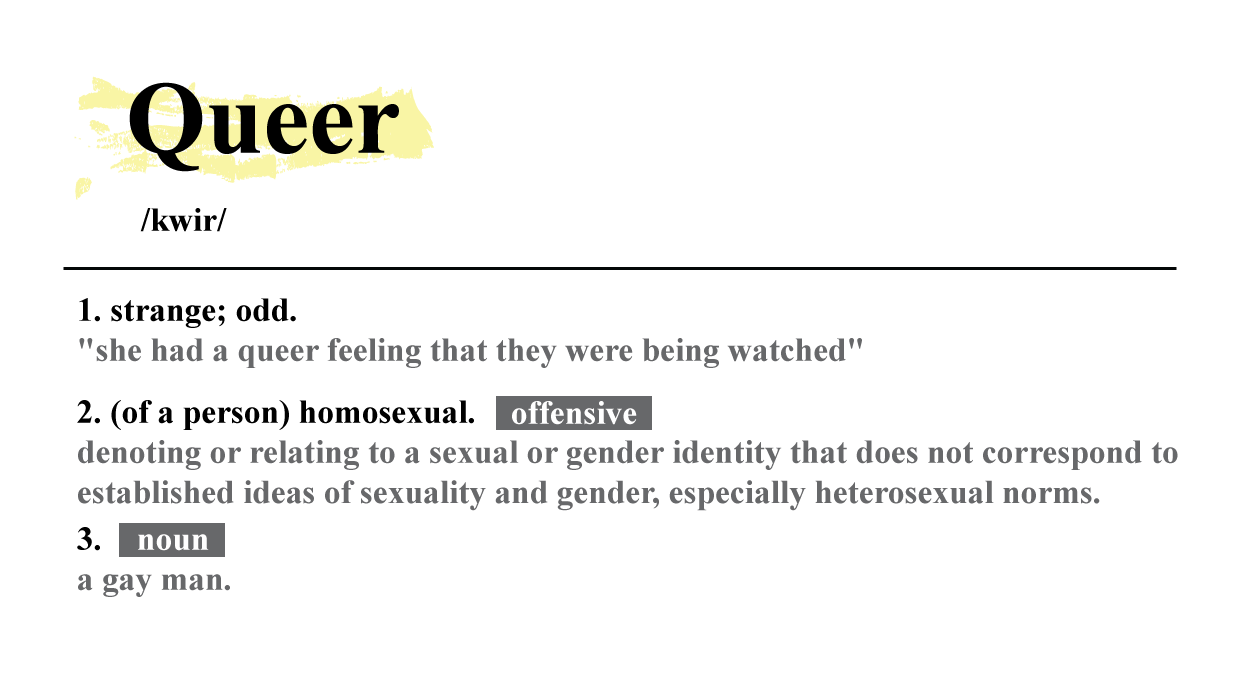
“Queer” is a word with a complex and contentious history.
Today, we associate the word “queer” mostly with the LGBTQ2S+ community. The term is often used in contexts like “queer theory” and “queer history,” or as a positive self identifier among queer people.
However, there’s an ongoing debate about whether or not “queer” is an acceptable term to use.
The word “queer” can be traced back to 1513 when it meant peculiar or eccentric. The current definition of “queer” in the Oxford English Dictionary is “a homosexual; esp. a homosexual man.” However, “queer” is also used as an umbrella term for all LGBTQ2S+ people—not just for those who are gay or lesbian. The Q in LGBTQ2S+ actually stands for both “queer” and “questioning.”
For years, “queer” was considered derogatory. However, since the 1980s—particularly during the AIDS epidemic and the ensuing resurgence of the gay rights movement—it has increasingly been used as a positive term by people within and outside the LGBTQ2S+ community.
Some attribute the origins of the movement to reclaim “queer” to Queer Nation, an organization combating anti-LGBTQ2s+ violence that was founded by members of the AIDS Coalition to Unleash Power (ACT UP). The group championed for the adoption of “queer” as a “sly and ironic weapon we can steal from the homophobe’s hands and use against him.”
Recently, “queer” has entered the mainstream as a term that’s more inclusive of non-normative sexual and gender experiences than “gay” or “lesbian” or even “LGBT” and its associated acronyms can be.
“Queer” defies categorization. As an umbrella term, it embraces everybody—especially those whose identities are sometimes overlooked within the LGBTQ2S+ community, including but not limited to non-binary, intersex, multisexual, and asexual/aromantic-spectrum people.
There’s a reason why “queer” is a term often rejected by Trans-Exclusionary Radical Feminists (TERFs) and supporters of respectability politics who believe that catering to cisheteronormative society is the only way to achieve so-called “equality.”
The open-ended, all-encompassing connotations of “queer” mark it as an explicitly anti-assimilationist term that rejects binaries and rigid definitions of sexuality and gender. As Queer Nation puts it, “[queer] is a way of telling ourselves we don’t have to be witty and charming people who keep our lives discreet and marginalized in the straight world.”
In other words, queerness frees us from adhering to society’s standards of acceptability and so-called normalcy.
Despite the growing use of “queer” in both academic and social contexts, its usage remains a topic of debate even among members of the LGBTQ2S+ community.
Some resent the term for its implications of peculiarity, while others embrace it for the same reason. Another common argument is that “queer” is still considered a slur against LGBTQ2S+ people and, therefore shouldn’t be used by anyone.
As with any reclaimed word, nobody is obligated to use the term “queer” to describe themselves if they don’t wish to. However, to argue that “queer” should be avoided entirely due to its history of being used in a derogatory way would also, by extension, eliminate the usage of other words that have been reclaimed by marginalized communities.
As queer people, we should be allowed to call ourselves queer without being told to censor our own identities. As the rallying cry goes, “We’re here, we’re queer—get used to it!”
Tags
etymology, Queer, Reclaiming the word
All final editorial decisions are made by the Editor(s)-in-Chief and/or the Managing Editor. Authors should not be contacted, targeted, or harassed under any circumstances. If you have any grievances with this article, please direct your comments to journal_editors@ams.queensu.ca.
